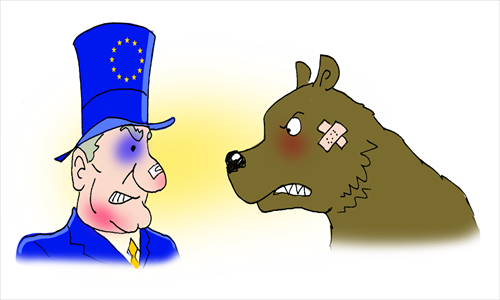HOME >> OP-ED
Extending sanctions simply delays finding a solution to Ukraine crisis
Source:Global Times Published: 2015-7-1 20:58:02

Illustration: Liu Rui/GT
Last week, immediately after EU leaders prolonged sanctions against Russia until 2016, Russia responded by signing an order to extend counter-sanctions against Europe for one year. The prolonged restrictions will not only cause the frosty relations between the two sides to get even icier, but also ultimately lead to an obvious result - doing nothing apart for hurting themselves, while leaving the fundamental problem unresolved.
Russia will definitely suffer. Yet precisely how badly the sanctions will hurt the country remains to be seen. One thing that should be noted is that Russians have proved themselves to be tough in the face of hardship. During Russia's reforms in the 1990s, the country's economy was on the verge of collapse, but Russians endured and survived.
In wake of Western sanctions, Russia is also seeking other channels for its imports and exports by looking east, including strengthening its cooperation with China. Therefore, the nation will go through a difficult period, but it will not reach an impasse.
However, the sanctions will light the EU's beard on fire while they are trying to blow out Russia's oil lamp. A study conducted by the Austrian Institute of Economic Research shows that the EU may lose a total of 100 billion euros ($112 billion), around 2 million jobs, and see a dramatic decrease in its imports in response to the cost of trade sanctions imposed to Russia, if the crisis continues and the situation does not change eventually. Moreover, the EU already has enough of its own issues to worry about for the moment. The uncertainty caused by the potential Grexit and Brexit are making European leaders feel overwhelmed. An increasing number of Europeans do not want to suffer more because of the sanctions, which provide Putin more room to maneuver in the crisis by using these divergences.
Even so, it will be impossible for the EU to lift its sanctions altogether, for the root of the problem still remains an open question.
The greatest problem for the moment is the Minsk deal. Despite the fact that each side agrees that the deal should act as the basic document to resolve the Ukraine crisis, Kiev has shown itself unable to fulfill the articles in it. For instance, Russia asked Ukrainian President Petro Poroshenko to recognize the legitimacy of the forces in eastern Ukraine, but Kiev treats them as separatists and terrorists. It cannot consent to Russia's request.
The Kremlin also demands Kiev give greater autonomy to the restive region, but Poroshenko has given no signal that he will accept this. He signed the deal, but from the bottom of his heart, he rejects it. This is why, during the recent G7 summit, he stirred things up and provoked further conflict in eastern Ukraine.
Consequently, the problem will drag on. Since it involves the entire geopolitical landscape, more time is needed for the crisis to reach a conclusion.
Extending the sanctions is only a passive solution, as it literally means that the matter is simply put aside until some other time in the future. As nobody knows a fundamental way of resolving the issue, the future of Ukraine and the ties between Russia and the West are unknown. But it also means there will likely be no sharp turn for the worse. If both the EU and Russia did not simply prolong, but increased the scope of sanctions, we will seriously need a new round of discussions about them.
The article was compiled by Global Times reporter Li Aixin based on an interview with Pan Dawei, director of the Center for Russian Studies at Shanghai Academy of Social Sciences. liaixin@globaltimes.com.cn
Posted in: Viewpoint